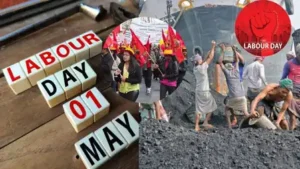International Labour Day 2025 — Know Date, History, Significance, And More
International Labour Day 2025 is on May 1st. This day is committed to allowing employees and their commitment. The fight for better wages and working conditions by employees began in the late 19th century. In many countries, it has been accustomed as an official day off to promote workers’ rights. This day serves as a reminder of the importance of fair treatment for all in the workplace. It encourages people to advocate for employees globally. Honors often include parades, speeches, and rallies. Additionally, it serves as a reminder to increase wages and improve safety in the workplace. On Labour Day, we should indicate the progress made and the efforts still needed to secure workers.
When Is Labour Day 2025? Exact Date and Observance
Labour Day 2025 will be celebrated on May 1st, a date recognized by numerous countries around the globe. This occasion, referred to as International Labour Day, is designated as a public holiday in more than 80 nations. While the majority of countries observe Labour Day on May 1, some, such as the United States, commemorate Labor Day on the first Monday of September. In areas where Labour Day is recognized as an official holiday, employees typically enjoy a day off. Many organizations also provide recognition or allow employees a break to appreciate their contributions. If you intend to celebrate Labour Day this year, it serves as an excellent opportunity to contemplate workers’ rights or engage in local activities. Whether you choose to organize marches, participate in community gatherings, or simply take a rest, each effort contributes to raising awareness.
The History of Labour Day
The origins of Labour Day can be traced back to the late 19th century, when workers advocated for equitable working conditions. At that time, factory employees endured extended hours, inadequate wages, and hazardous working environments. The labor movement emerged to demand improved treatment and fair compensation. One such instance was the Haymarket Affair in Chicago in 1886, where workers regrouped for an eight-hour shift and a bloody altercation ensued. This episode stunned international support for workers’ rights despite the chaos. The International Workers’ Guild officially declared May 1st to be International Labor Day in 1889. Different countries honored Labor Day at different times. For instance, the United States established Labor Day in September 1894, while the United Kingdom recognized it in the early 1900s. Over time, Labour Day evolved from a platform for political protests to a celebration of workers’ achievements, thanks in large part to the efforts of numerous well-known individuals, most notably labor union leaders and organizations.
The Significance of Labour Day Worldwide

Labour Day is established to honor the commitment and contributions of workers worldwide. It serves as a significant reminder that the operation of industries, businesses, and economies depends on the daily efforts of individuals. Recognizing this promotes a societal appreciation for fair wages, safe working environments, and the rights of workers. Nonetheless, significant challenges persist. Issues such as income disparity, concerns regarding workplace safety, and the rights of gig and informal workers require further attention. Labour Day provides an opportunity to contemplate these persistent challenges. Esteemed labor leaders emphasize the importance of unity in advocating for a more equitable work environment. This holiday transcends mere relaxation; it embodies the pursuit of enhancements and respect for all workers.
How Different Countries Observe Labour Day
Around the globe, Labor Day is celebrated in various ways. Some nations organize parades, marches, and rallies to demonstrate solidarity and strength, while others engage in cultural festivities, picnics, or public addresses. In the United States, Labor Day in September signifies the unofficial conclusion of summer, characterized by parades and barbecues. In India, May Day is marked by significant rallies and protests. Numerous European countries, including Germany and France, conduct marches and public assemblies to commemorate the labor movement. These celebrations enhance awareness, shape policies, and motivate workers to advocate for improved conditions. They remind us that the rights of workers are fundamental to establishing equitable societies. When communities unite during these occasions, it ignites a collective voice capable of driving change.
The Future of Labour Day and Workers’ Rights
As we gaze into the future, the employment landscape is experiencing considerable change. A growing number of roles are transitioning to remote work, while automation and artificial intelligence pose a risk of displacing many traditional jobs. The gig economy is on the rise, yet numerous workers lack sufficient protections or benefits. Labour Day presents an opportunity to respond to these shifts, highlighting the importance of modernizing labor protections to reflect current work realities. This includes advocating for fair wages, fostering safe remote work conditions, and guaranteeing that gig workers enjoy the same rights as those in conventional employment. Each individual has a role to play; workers can engage with unions or voice their concerns, employers can implement fair practices, and legislators can enact laws that safeguard workers’ rights. Fostering an inclusive and secure workplace is advantageous for everyone, both now and in the future.
Conclusion
Labour Day 2025 is a chance to remember the deep history and ongoing importance of workers’ rights. From its origins in protests for fair hours to today’s celebrations, the holiday reflects an ongoing fight for dignity and justice.
Recognizing workers’ efforts, fighting inequality, and pushing for safer workplaces remain vital. Labour Day offers an opportunity for collective action—whether through community events or personal advocacy. Let’s honor the contributions of workers worldwide and support efforts toward fairer, safer, and more respectful workplaces.




